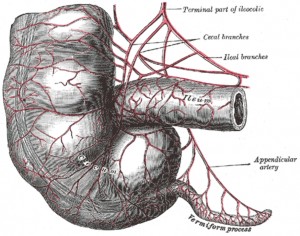
New research shows a network of immune cells helps the appendix play a pivotal role in maintaining digestive health, supporting the theory that the appendix isn’t a redundant organ.
The research team, a collaborative partnership between the groups of Professor Gabrielle Belz of Melbourne’s Walter and Eliza Hall Institute, and Professor Eric Vivier at the Centre d’Immunologie de Marseille-Luminy, France, found that innate lymphoid cells (ILCs) are crucial for protecting against bacterial infection in people with compromised immune systems.
By preventing significant damage and inflammation of the appendix during a bacterial attack, ILCs safeguard the organ and help it to perform an important function in the body, as a natural reservoir for ‘good’ bacteria. The research is published in today’s issue of Nature Immunology.
Professor Gabrielle Belz, a laboratory head in the institute’s Molecular Immunology division, said the study’s findings show that the appendix deserves more credit than it has historically been given.
“Popular belief tells us the appendix is a liability,” she said. “Its removal is one of the most common surgical procedures in Australia, with more than 70,000 operations each year. However, we may wish to rethink whether the appendix is so irrelevant for our health.[xyz-ihs snippet=”adsense-body-ad”]
“We’ve found that ILCs may help the appendix to potentially reseed ‘good’ bacteria within the microbiome – or community of bacteria – in the body. A balanced microbiome is essential for recovery from bacterial threats to gut health, such as food poisoning.”
Professor Belz said having a healthy appendix might even save people from having to stomach more extreme options for repopulating – or ‘balancing out’ – their microbiomes.
“In certain cases, people require reseeding of their intestines with healthy bacteria by faecal transplant – a process where intestinal bacteria is transplanted to a sick person from a healthy individual,” Professor Belz said. “Our research suggests ILCs may be able to play this important part in maintaining the integrity of the appendix.
“We found ILCs are part of a multi-layered protective armoury of immune cells that exist in healthy individuals. So even when one layer is depleted, the body has ‘back ups’ that can fight the infection.
“In people who have compromised immune systems – such as people undergoing cancer treatment – these cells are vital for fighting bacterial infections in the gastrointestinal system. This is particularly important because ILCs are able to survive in the gut even during these treatments, which typically wipe out other immune cells.”
Professor Belz has previously shown that diet, such as the proteins in leafy green vegetables, could help produce ILCs. “ILCs are also known to play a role in allergic diseases, such as asthma; inflammatory bowel disease; and psoriasis,” she said. “So it is vital that we better understand their role in the intestine and how we might manipulate this population to treat disease, or promote better health.”
This research is supported by the National Health and Medical Research Council of Australia, the Australian Research Council, the European Research Council, the Ligue Nationale contre le Cancer, INSERM, CNRS, the Agence Nationale pour la Recherche, the Aix-Marseille University to Centre d’Immunologie de Marseille-Luminy and the Institut Universitaire de France.
Source: Walter and Eliza Hall [xyz-ihs snippet=”Adversal-468×60″]
[content id=”18639″]



